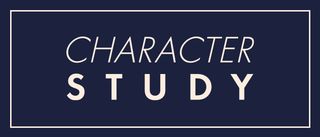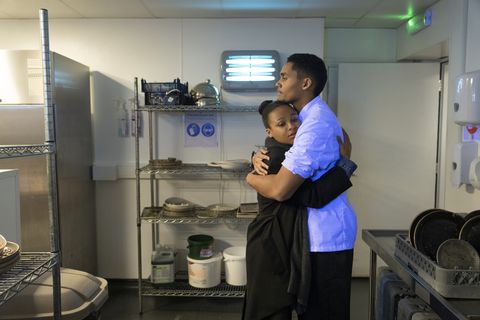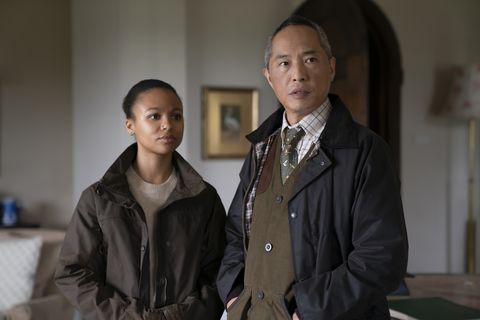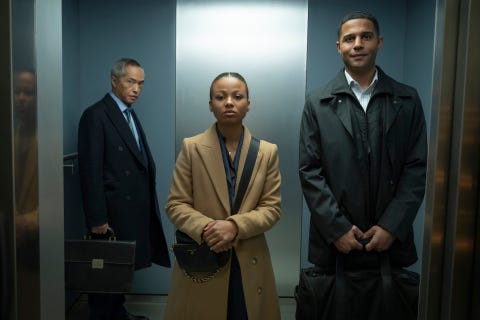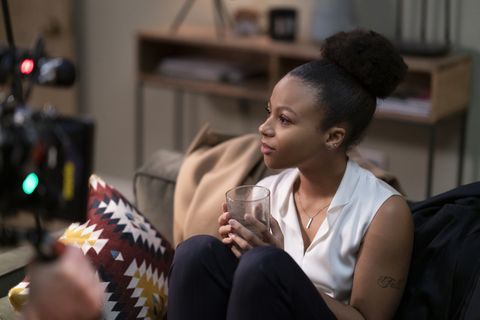Inside the Mind of Harper, Industry‘s Very Complicated Leading Woman
In ELLE.com’s recurring feature Character Study, we ask the creators behind our favorite shows to go deep about what went into creating their memorable characters: the original idea behind them, how they were tailored to the actor and elements of them we might not see on the screen.
College friends Mickey Down and Konrad Kay toiled in the world of London banking before transitioning to writing and bringing the frustration, competition, and excess they experienced in finance to the screen in HBO’s Industry. Focused on four junior analysts working at the fictional company Pierpoint, the show finds its lead in Harper Stern, who, as a Black American, finds herself on a singular path through the industry.
The aim of the series was to avoid replicating the screen depictions of business that we’ve seen before. “The thing that unlocked the show, really, from being a derivative banking drama, was seeing it through the eyes of people who we hadn’t seen in this world before,” says Down. “It wasn’t as cynical as let’s create the Black female antihero but it was us trying to see this pretty rarified world through the prism of someone who had the least amount of power in it. We love the idea of having an outsider trying to be on the inside.”
Harper, played by Myha’la Herrold, spends the second season trying to navigate the shifting sands of the post-pandemic economy and build her own reputations. Ahead of Monday’s season 2 finale, Down and Kay spoke to ELLE.com about the director who inspired Harper’s personality, how her fractured family fuels her drive, and the mentor she finds within Pierpoint.
What were the first seeds of Harper?
Mickey Down: We were in the writers’ room and we came up with Harper. It was really the first writers’ room we did for season one. We had a writer called Nia DaCosta, who’s now a huge director. At that time, she had just made her first film and there was a small window of opportunity.
Me and Konrad knew the other characters really, really well. We spent years thinking about them. Whereas Harper we really did flesh out in that first room with Nia. And a lot of Nia’s characteristics, I hope she doesn’t mind me saying this, came out in Harper. I don’t mean the negative ones! I mean the go-getting ambition, I mean the steadfastness, the survivalist nature. The stuff that me and Konrad love about Harper came from those conversations.
What are Harper’s defining qualities?
Konrad Kay: There’s a bit of a change from season one to season two in the level of comprehension of the character. A pretty fair criticism of the show in season one was that she was a bit of an avatar and a bit hard to place. What me and Mickey really wanted to do in season two was to peel back the layers of her relationship with her twin brother, which was very formative to her conception of herself. A lot of people watch her and go what is this underlying need? It’s almost to the point of self-sabotage, this need she has to prove herself. Is it as simple as financial reward? Why is she willing to burn every bridge to get there? There’s this thing that’s nagging at her which makes her kind of hard to empathize with her, but, I think, also for a certain type of person watching the show, very easy to empathize with.
We had this conception of her twin brother being this tennis star and having this relationship with her mother which was very toxic. We figured her mother was Hungarian, someone who emigrated to the United States very young and married very young. Having left a Communist country, she had a very, very clean capitalist take on what a successful life looked like. That was self-sufficiency, it was money, it was all of these things. If she had those internalized lessons from her mother and her brother had basically given up that life having been on the precipice of great success as an athlete, what did it look like for her when she assumed he was dead for three or four years? She says this line to Yasmin at the end of season one, “I’ve been living for two people.” She’s taken that message of her parentage to this most extreme manifestation of I am going to do literally anything to get ahead.
That is married to a world where there are loads of microaggressions and also marcoaggressions. Where the odds are just constantly stacked against her favor so she has this tunnel vision and barrels her way through to what she perceives to be the top of an industry.
What is the significance of her being a twin?
Kay: This is a slightly more intellectualized answer but they had this fight in episode five where he says this really cruel line to her like, “Sometimes I think we shared a womb together but only one of us was going to ever make it out.”
For me that line sums up the pretty tough theme of the show, which is that in some ways competition starts on that biological level and it goes all the way through to these really hierarchical power centered institutions.
Down: Weirdly, I know a few twins who have lost their siblings at an early age. The line about living for two people is one I’ve heard before. “There’s a huge hole in my life, which I have to fill. I have to be doubly ambitious, work doubly hard, I have to live the person’s life now that the person isn’t able to live it.” I feel like Harper had no idea where her brother had gone. I think she had probably wrestled with the idea that he had committed suicide.
I do think that Harper has a need to fulfill the ambitions and wishes of her twin brother, especially given that where they came from ambition and success against everything else was the North Star.
Why do you think she and Eric connect?
Down: People find it very hard to categorize what their relationship actually is. The first season was almost an exploration of the mentee/mentor relationship. In finance it’s kind of random who you’re sat next to and who you’re sat next to can really determine how your career goes. For example, Yasmin is sat next to Kenny, through no fault of her own, and he has all these prejudices against her and makes her life a living hell. Whereas, Harper finds herself sitting next to Eric who takes a huge interest in her and wants to champion her and build her career up.
I think at the start Eric sees in her someone that would not be afforded these opportunities unless he was giving them to her. He sees someone who comes from a lower middle class background. Someone that has not been to a “top” university. Someone who has basically lied about their qualifications to get into the door, whereas there are so many rich scions of families where this job was handed to them. When she has that little an amount of power, he wants to champion her.
The shift between season one and season two is the thing that Danny Van Deventer says to her which is, Eric, he’s terrified of youth unless he can control it. I feel like as soon as that person breaks from the shackles they become a threat to him. That’s really the shift in their relationship.
How do you think she ended up in this job?
Kay: Within the logic of the show, that all comes down the fact that Eric has gotten to the point in his career where he’s powerful enough basically to usher that through. I think says a lot about how he feels about Harper and how much potential she has. I do think, obviously, going back to the idea that we love telling our side of the stories, in terms of the context of a financial world, coming from a SUNY school, having no degree, being a Black woman from New York and making it to the epicenter of European finance, is the ultimate manifestation of outsider to insider.
I find her name significant. I’m wondering if there’s a yet to be explored cultural angle in her presumably being Jewish?
Down: We don’t want to give too much away because this is stuff we want to drip feed, but the idea that she has her mother’s name and isn’t allowed to see her father is built into the character. There’s a very blink-and-you-miss-it reference to the fact that she’s not allowed to see her dad, which is a huge reveal for the character, actually. It’s something we want to explore later on down the line.
Do you think she had friends as a kid and in college? What was her social life like?
Kay: A lot of season two, across all the characters, is about the relationship to vulnerability and your own sense of whether you deserve love. All of the characters on some level, Harper and Robert very acutely, have baked into their DNA the idea that they’re always going to turn away from people showing them affection because they’re scared they’re not worthy of it. Harper really feels that very strongly. Her whole relationship with Danny is our way of trying to show her softening and allowing the potential for that into her life. Then her run in with her brother basically hardens her up into an even tougher version of herself.
I know Michael Mann, when he talks about Heat, he’s written these huge pre-biographies for all of the characters. We’ve definitely not done that with Harper. We haven’t charted her college years.
Down: We talk about it.
Kay: But not in forensic detail. I think we’ve talked in the past about the idea that she didn’t allow herself to get too close to people. The one relationship we decided to dramatize in season one was a serious college boyfriend who really was not there for her in her most emotionally needed time.
Down: We conceived him as having some family money or being able to coast for a little bit, take some time out. We imagined that he was one of these guys who didn’t have to think about where he was going in life, would sort of coast, would have a few relationships down the line. There’s a reference to him dating a new girlfriend, reference to him doing a mini tour of Europe. All of that stuff feels like the stuff that made Harper feel like she was on the outside. It’s another rarefied world that she wasn’t really part of.
Again, the idea that he wasn’t really there for her when she was going through her most traumatic experience, I think that says as much about Harper as it does about him. She was saying I’m having a panic attack.
In season one, he even says, “Come on, you’ve got to talk to someone about your brother.” Suggesting that she needs to talk to a professional. She immediately just puts the kibosh on that straight away and says absolutely no way. In season two, Eric suggests, even if it’s just a corporate dictate, that she goes to speak to a therapist and again she puts the kibosh on it.
How did the casting of Myha’la shape the character?
Kay: Myha’la taped and me and Mickey knew it was her immediately. She’s a very alive, very intelligent actress. Everything is in her eyes. She’s both vulnerable and sure of herself which is a very important thing for the character.
She just brought so much more of herself to the character than was on the page. We had a little bit less surety. Myha’la is very self-possessed and charismatic, but also she felt the same insecurity as Harper. She was also coming overseas for her first big job. It wasn’t necessarily that we tweaked the dialogue or the voice but there was a front-footedness that Myha’la had that we started leaning into scenes with.
How has Harper grown?
Kay: I think Harper is too young and too unwilling to do the work on herself to see her own capacity for being self-destructive. We sometimes talk about what we intend to do, what we write, and what ends up on screen. Even if you’re in the edit and you’re writing, ultimately sometimes there’s a subconscious thing you can’t control about what ends up out there. What I love is having a break from the show and then coming back and watching it and speaking to Mick. The thing I come back to on season two, the show does a very good thing of writing about a very human thing you don’t see on the screen very often, which is your capacity to be your own worst enemy.
Where do you think she’ll be in 20 years?
Kay: That’s a really good question. That would be telling. You mean season 20?
Yes, in 20 years when you’re still on air.
Down: The thing about this is that me and Konrad don’t go that far ahead, but part of the joy in writing a show where people are at the start of their careers and the start of their lives and they’re young is that you do imagine where they’re going to be in five, ten, fifteen years. The question is whether she’ll be happy or not. I don’t want to give too much away but I think, unfortunately, the answer is no.
Kay: It’s very hard to say. The thing is, we would love to write a sweet ending for her but I don’t think HBO would let us.
Down: Again, this is a redundant way of looking at the show but the show is about the cost of ambition and what it takes to be successful and the question is whether Harper is willing to meet that cost to be successful.
This interview has been edited and condensed for clarity.
Adrienne Gaffney is an associate editor at ELLE who previously worked at WSJ Magazine and Vanity Fair.


